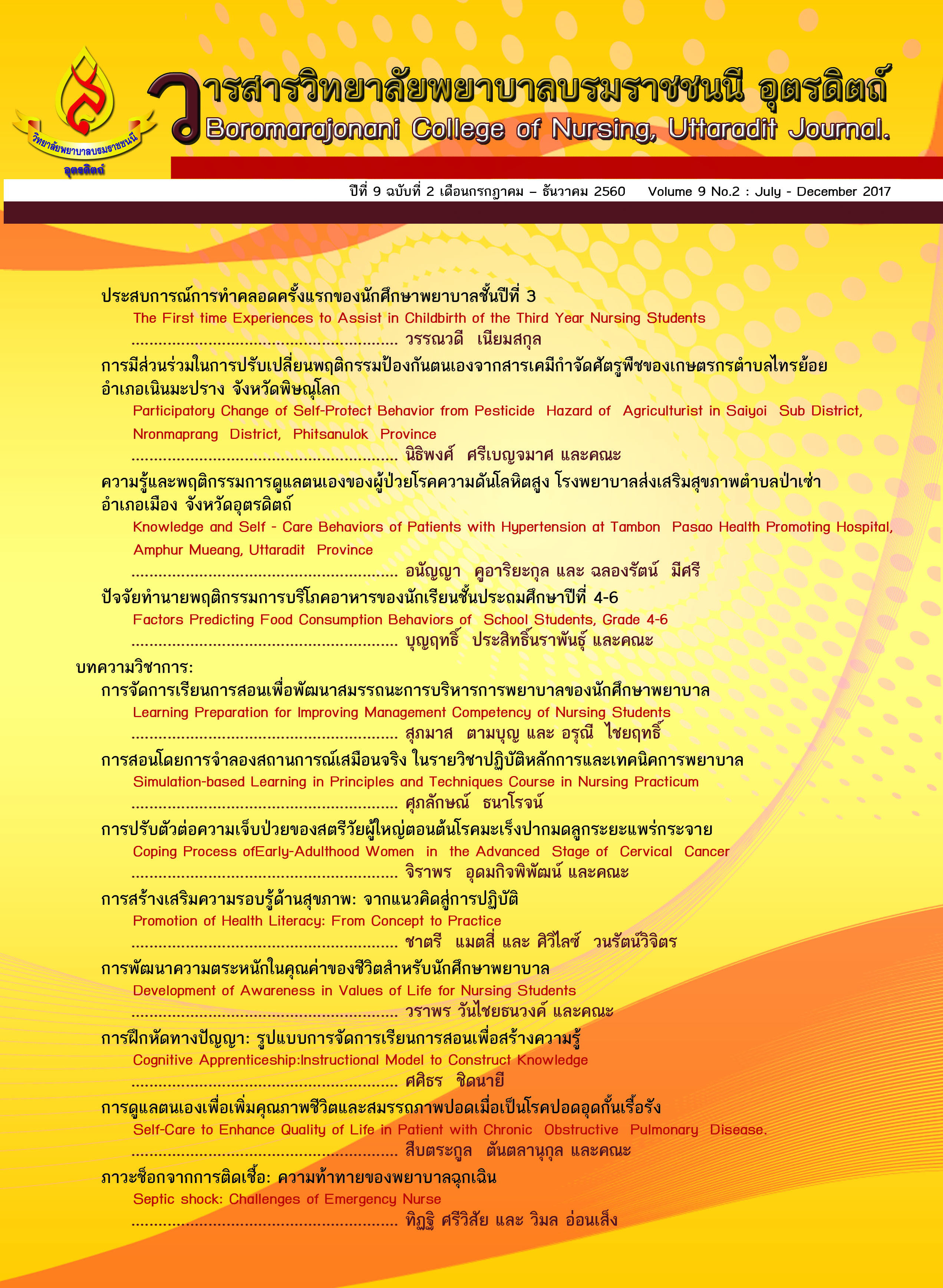การพัฒนาความตระหนักในคุณค่าของชีวิตสำหรับนักศึกษาพยาบาล
Main Article Content
บทคัดย่อ
Awareness in values of life is a characterisitc that represents the spiritual condition of a person in self awareness, faith in goodness, realization of self values , understanding life and understanding other people, perception and understanding of sufferings. When people understand and sympathize with others, they would understand themselves and understand each other thoroughly, encourage mutual support and have mercy on each other. This would make them have good mental health, understanding, sympathy and forgiveness for others. People who take care of them selves with contentment would be able to convey their kindness to others. This article aims tobe a guideline for cultivating nursing student’s awareness in values of lifeto find their self-esteem , to have peace, to be optimistic and to think positively. Nursing students practice to take care of themself and other people in a spiritual way to be a nurse who has the spirit of caring for humanistic nursing care . A guideline for improving the awareness in values of life for nursing studentsis done by continuing the practical group activities such as meditation, deep listening, reflection, story telling, video with sample cases and learning from the real situation
Article Details
บทความหรือข้อคิดเห็นใดใดที่ปรากฏในวารสารวิจัยการพยาบาลและวิทยาศาสตร์สุขภาพ เป็นวรรณกรรมของผู้เขียน ซึ่งบรรณาธิการหรือสมาคมศิษย์เก่า ไม่จำเป็นต้องเห็นด้วย และบทความที่ได้รับการตีพิมพ์เผยแพร่ถือเป็นลิขสิทธิ์ของวารสารวิจัยการพยาบาลและวิทยาศาสตร์สุขภาพ
เอกสารอ้างอิง
2. Boontong,T. (2008). Nursing power and Health System Reform. The Doctor's Magazine. 30(18):41-45. (in Thai).
3. Borden, M. E. (2009). Applying an Integral Perspective to Business Strategy: A Case Study. Germany: Springer–Verlag Berlin Heidelberg.
4. Chopchai, P., et al. (2002). The development of Nursing Process : Application of Orem's Theory.Khonkaen: Khonkaen University. (in Thai).
5. Craven, R. F. & Hirnle, C. J. (2002). Fundamental of nursing: Human health and functions. (4th ed.) Philadelphia: Lippincott Williams & Wilkins.
6. John, S., (2000). Spiritual dimensions of pastoral care. Great Britain : Ateneam press.
7. Jumpeereung, S.(2013) Development of Curriculum to Enhance Desirable Characteristics through Dialogue for Nursing Students.Journal of Education. Naresuan University.15 (3): 9-15. (in Thai).
8. Pintapat, S. (2007). Human behavior and development. Bangkok :RajabhatUniversity, SuanSunandha.
9. Pornkul, C. (2011). Teaching Thinking Process: Theory and Implementation. 2nd ed. Bangkok :V-print (1991). (in Thai).
10. Srisangnam, U. (2003). Spiritual health.Available http://www.jogandjoy.com/Html/Colums_March/Soul.html. (January 10, 2010).(in Thai).
11. Sungkapong, T., et al. (2010). Effects of coaching and reflective learning on competency and Satisfaction towards the teaching and learning process of nursing student. Siriraj Medical Journal.55(12): 721-731.(in Thai).
12. Tongprateep, T. (2009). Spiritual :The dimension of nursing. Bangkok : Chulalongkorn University. (in Thai).
13. Wichianpunya, J. (2006). Knowledge management to develop knowledge facilitator.Rangsit University Journal. 6(1) : 60-71. (in Thai).
14. Yolao, D. (2010). Creating an Assessment Tool and a Spiritual Development Level Indicator for Public health personnel. Bangkok : Srinakharinwirot University. (in Thai).


